Does Donald Trump fit the definition of a fascist?
ABC's poll suggests half the country believes so; but is the media using manipulative language to fit a narrative?
Mid-October, I foolishly (wisely? … tbd?) began writing on politics. Perhaps foolishly in that this newsletter isn’t intended to be a political publication, per se. Wisely in that it seems to be accelerating the pace of the newsletter’s growth. But like your middle school English teacher on Facebook and so many other annoying subject matter experts nonexperts in America, I can’t resist the sudden urge to L.A.R.P. as a political pundit once October hits during an election year. Can’t resist it. Won’t, in fact.
I feel compelled to write about politics because there are systemic problems in America that have led to serious national issues. Issues which currently lack solutions, and therefore, issues that warrant serious discussion and debate. Although this discourse is publicly alive, it is not well. We live at a time when both partisan tribes insist that democracy itself is on the ballot—that their candidate is the only thing standing between society and impending doom. I think they’re both wrong. And I think that the upcoming election—no matter the outcome—will not be as gravely consequential as it’s being made out to be.
If you’ve had enough of the political chatter already, no sweat. Go read a Substack post about why Tony Soprano is hot. Or go listen to Hawk Tuah Girl’s new podcast. All good, I’ll just be here talking about politics until… well, until something else seems more timely and relevant to talk about.
Donald Trump, the politician
My political foray as a writer began with an opinionated piece criticizing Kamala Harris on account of the VP’s lousy leadership skills and disingenuously-handled policy failures. In the spirit of my disdain for down-ballot voting (it’s a lazy way to exercise civic duty), it’s only fair that I address criticisms of her opponent, The Donald.
By now, as we’ve hit the final stretch of his third consecutive presidential campaign—and presumably his final campaign, given that he’s 78—the voting populous is well-acquainted with Donald Trump, the politician. Criticisms abound (and justifiably so), Trump presents a more complicated character to form an objective opinion around than does Kamala.
Indeed, there remains a seeming lack of consensus around exactly who, at a fundamental level, Donald Trump is. His character features double as flaws, and his strengths are, depending on who you ask, actually his weaknesses. It’s like everything he says or does manages to inspire the right while simultaneously enraging the left.
And that’s fair enough—Trump’s always been a polarizing character, even before transitioning to political servant from real estate tycoon turned one-man firing squad on The Apprentice. Never one to shy away from a camera, his brand was built on showmanship, and rests on a foundation of the ‘I’m the boss, I run shit ‘round these parts’ ethos—a persona often glorified in capitalistic societies (and in the WWE ring).
Let’s be honest, he’s kept that same Rockefeller-meets-Boss Hogg-meets-professional wrestler energy—authentically and unapologetically rooted in asshole-ish capitalistic pig-ishness. Cutting through the heart of the American Dream, that persona, was (and is) the charm of The Donald. And it’s the reason for his epic rise to household-name popularity that was set in motion several decades ago.
He’s never not projected this persona, and the nine years since infamously riding down the golden escalator have proved no exception. Indeed, through the many highs and lows of his roller-coaster of a political career, he hasn’t changed one bit. Meanwhile we’ve seen Americans’ perception of Trump oscillate quite dramatically (especially in the wake of Jan 6).
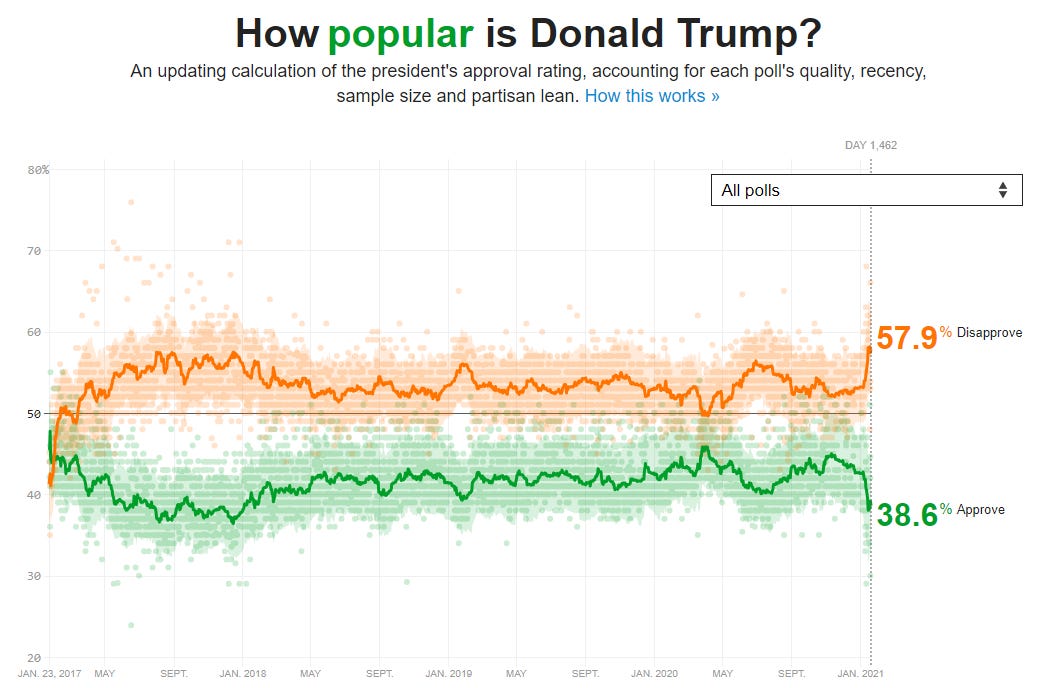
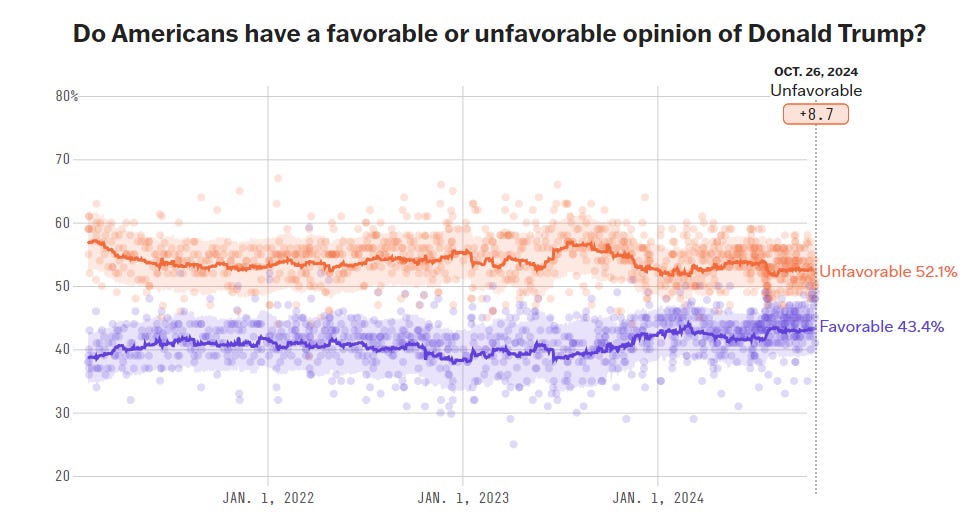
That’s fitting, too; after all, the man has won and lost… bigly. To describe, in depth, his laundry list of shortcomings and past transgressions here would sacrifice brevity, and frankly, be an exercise in beating a dead horse. I suppose that’s the job of the left-wing media, though they often forget that it isn’t their only job. Same goes for his strengths and successes (which isn’t a short list either), and covering them being the job (or, one of the jobs) of the right-wing media. Both sides in the media have certainly done their job in this respect.
We can also argue ad nauseum on the cost/benefit profile of Trump’s policy proposals, and how they stack up to his opponent’s. While that is important, plenty are already having that discussion in depth (here, here, here, and here).
But if you still believe Trump, himself, doesn’t believe he’ll help the country (or that he doesn’t wish to help the country) in the event he’s elected president, I don’t know what to tell you. Maybe think about the risk he took in running again in 2024 after going down in flames in the wake of the 2020 election. With the balance of power shifting toward the Democrats in 2020, and even further toward the Democrats following the 2022 midterms, he knew he’d inevitably be the target of what the right is calling “lawfare”.
Call it what you want, but I’m far from convinced that Trump would’ve been prosecuted to such an extent had he not made the decision to run for office again—a decision he announced shortly after the 2022 midterm elections, which is when the legal prosecutions began in earnest. Since then, we’ve been told he’s a criminal, we’ve been told he’s unhinged, and now we’re now being told he’s fascist (yet again). Two years, two assassination attempts, and dozens of lawsuits later, Trump marches ahead. You gotta give it to him, he’s a political warrior; but is he a fascist?
This newsletter is most easily read on the Substack app, where you can seamlessly follow and subscribe to a variety of interesting publications:Trump is a bigot, a racist, a fascist, a … Trump is literally Hitler
“Did you hear the news? America is under threat from a big bad fascist named Donald Trump! He and his evil fellow-fascies have a meticulous plot to destroy democracy unless we stop them from controlling the White House! A vote for Kamala is a vote to save democracy!”
— U.S. mainstream media, incessantly
Make no mistake, the U.S. is no stranger to politicians labeling one another fascists—especially in election campaigns—and the media has always played an integral role. Trump has had to overcome political adversaries—including those in the media and academia—labeling him a fascist throughout each of his three campaigns.
When I began writing this over a week ago, the ‘Trump-fascist’ rhetoric hadn’t exactly proliferated, though there were rumblings. Now with Election Day only a week out, it’s hard to miss. If somehow you haven’t been peddled some flavor of language likening Donald Trump to an angry fascist dictator, then you must be intent on steering clear of election news. Or at the very least, you don’t pay attention to the mainstream news media outlets.
I first caught wind of the reemergence of the new ‘F-word’ in town a couple weeks ago while browsing the U.S. Election tab on Substack’s homepage1. Then I came across “reporting” from The Atlantic, who was early to the anti-Trump party (and they’re still partying).
The Atlantic can be (and often is) dismissed as a fringe left wing publication. But they were finally able to get their message across, with yet another headline likening Trump to Hitler. This time, the kicker was a damning quote from Trump’s former chief of staff John Kelly, likening Trump to a fascist—the perfect fodder for leftists to crank up the volume.
The quote came three weeks after CNN quoted Kelly in an attempt to smear Trump with a myriad of ‘Trump is bad’ talking points—exhausted talking points that the left has been recycling for years. And it came two months after Kelly initially denounced Trump (again via CNN).
Kelly’s previous ‘Trump bad’ talking points garnered little attention—that horse has been beat to death. But when Kelly pulled the ‘Trump is a fascist’ card on October 22, it finally set the narrative in motion at the mainstream level. Via The NY Times report, quote:
Kelly said that based on his experience, Trump met the definition of a “fascist.”
In response to a question about whether he thought Mr. Trump was a fascist, Mr. Kelly first read aloud a definition of fascism that he had found online.
“Well, looking at the definition of fascism: It’s a far-right authoritarian, ultranationalist political ideology and movement characterized by a dictatorial leader, centralized autocracy, militarism, forcible suppression of opposition, belief in a natural social hierarchy,” he said. …
He added: “Certainly the former president is in the far-right area, he’s certainly an authoritarian, admires people who are dictators — he has said that. So he certainly falls into the general definition of fascist, for sure.”
The quote made headlines across the news media landscape and Kamala ran with the headlines, amplifying her rhetoric on October 23 by taking to Twitter X as she compared Trump to Hitler and claimed that the former president vows to become a dictator.
Harris then unequivocally labeled Trump as a fascist during CNN’s town hall the evening of October 23.
And after publicly labeling Trump a fascist, Kamala’s social media messaging persisted.
And finally, in case American voters still hadn’t received word that Trump is a fascist, the lovely folks at ABC ran and reported on a poll including the question: “Who’s a Fascist?” which provided the following answer choices:
Only Trump
Only Harris
Both
Neither
The results suggested that nearly half the country’s registered voters believe Trump is a fascist, while nearly a quarter believe Kamala is one2.
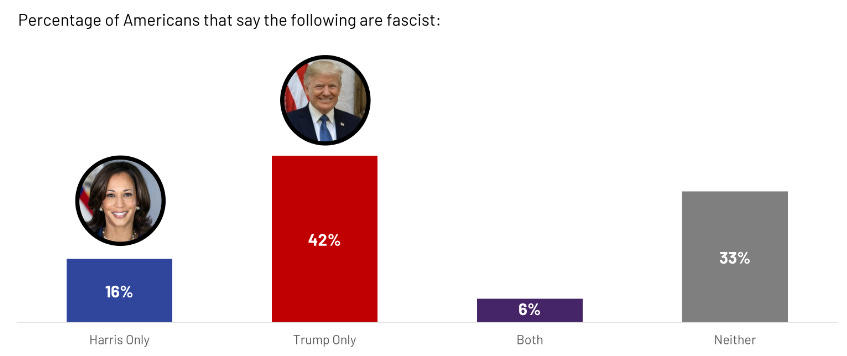
Indeed, a narrative has been crafted and a messaging campaign pursued by the left to spread the word, at both the grassroots and institutional levels. The message goes something like this: At best, “Trump” and “Fascism” belong in the same sentence; and at worst, Trump is literally spearheading the rise of the Fourth Reich.
This messaging campaign is, dare I say, a coordinated campaign3, in the sense that Democrats and Democrat-affiliated organizations (yes, the aforementioned mainstream news media outlets) have revved up the ‘Trump-fascism’ rhetoric in tandem with the Harris campaign’s narrative. To close the loop, ABC ran their poll and reported that it’s settled—yes, indeed, half the country believes Trump is a fascist!
The left’s cyclical messaging tactics have undergone a dramatic escalation in tone, from ‘Trump is weird’, to ‘Trump is mentally unstable’, to now, ‘Trump is a fascist’. All of this in the span of a few months—is it a coincidence that this escalation in tone and increased direness of rhetoric has materialized in lockstep with Kamala’s falling odds of electoral victory?
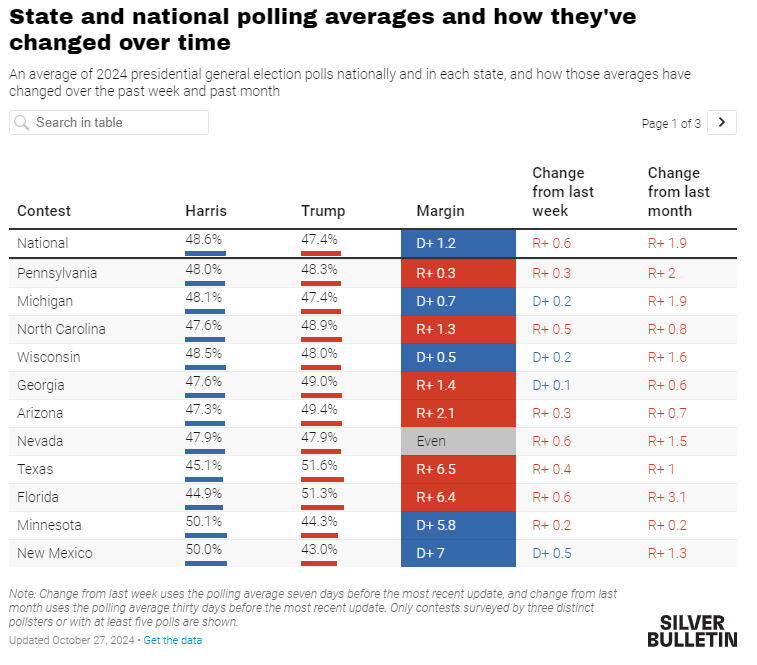
Of course, I’m not saying Trump and the Republicans aren’t guilty of similar truth-spinning tactics. Remember when the public was systematically convinced by the media, at the behest of the State and Defense Departments, that Iraq was a national security threat? This is par for the course in American politics, where dishonesty is a feature and not a flaw, and where the same set of tactics—or bag of tricks—are cycled through until proven ineffective.
And this latest trick proved no such thing; the rhetoric has seemingly landed with the American public. Look no further than Google search interest in “Trump Hitler” among users in the U.S., which is rapidly on the rise.
And when you actually execute this search in Google, the results yield a ‘who’s who’ of left-leaning news outlets—CBS, MSNBC, ABC, Vanity Fair, The Atlantic, The NY Times. (Not to go full tinfoil hat mode here, but Google is the top donor to the Harris campaign.)4
Similarly, it’s no surprise that awareness of (or search interest in) “Fascism” is on the rise.
At a secular level, there’s also been a growing awareness of fascism. By 2022, fascism references in literature had risen to levels not seen since the late 1940s, in the immediate wake of Nazi Germany’s demise.
So presumably, most literate people living in Western societies are familiar with the general hallmarks of fascism, even if we’re separated from it to a high degree—time-wise, geographically, or in America’s case, both. There’s a broad excess of reference points in 21st century literature and film, especially in modern internet media. I mean there must be at least fifty Hitler/WWII documentaries on Netflix alone. So from an historical context perspective, we have an established portrayal. But is that portrayal a valid gauge of what fascism technically is?
Authentic Intelligence is supported by intellectually curious, truth-seeking readers. Consider subscribing today so that future posts go straight to your inbox.What actually is fascism?
"But if thought corrupts language, language can also corrupt thought."
— George Orwell
Fortunate to have been born into a democratic society, fascism has always seemed, to me, a distant notion. Same with communism, totalitarianism, and authoritarianism for that matter. My understanding of these societal models are all theoretical, if you will, as opposed to observational or even anecdotal. (My grandfather served in the U.S. Navy throughout WWII, but passed away long before I was born.)
Personally, my grasping of fascism is replete with grim societal implications: the proliferation of totalitarian regimes whereby the citizenry are stripped of liberties through draconian measures. Whereby literature is propagandized, ethnic factions cleansed, and, in the case of Nazi Germany, outright genocide is committed.
Such conditions are incomprehensible to me in the ‘there are more stars in the universe than grains of sand on Earth’ kind of way. Sure, I’ve read about the Holocaust and watched my fair share of WWII documentaries, as one does. But the genuine examples of fascistic societies are far-fetched from the everyday life of Americans (or most other Western democracies, for that matter). Nonetheless, the fascist label is flippantly and increasingly tossed around in today’s political arena.
To that end, let’s endeavor to understand its meaning at a fundamental level with the technical definition. Ole’ Reliable (Merriam-Webster) defines it clearly:
Fascism: a populist political philosophy, movement, or regime (such as that of the Fascisti) that exalts nation and often race above the individual, that is associated with a centralized autocratic government headed by a dictatorial leader, and that is characterized by severe economic and social regimentation and by forcible suppression of opposition
Hmm… still a distant notion. No actually, in fact, this definition doesn’t even remotely describe the America that I know or have ever known in my thirty years of living on U.S. soil. As U.S. citizens, we can speak freely, vote at our discretion for political officials, pursue economic opportunities as we see fit, and are free to socialize with whomever we choose.
I’m free to (and I do) expose myself to a myriad of cultures by virtue of these same liberties having been granted to all Americans, spanning the spectrum of ethnic, racial, and religious diversity. I to have friends and family members—fellow Americans—that also span practically the entire socioeconomic spectrum; fascism as defined by Merriam-Webster isn’t remotely close to their version of reality, either.
The America I know isn’t even adjacent to the literal definition of fascism; it’s a melting pot of culture that perpetually sways from harmony to disruption, but with the pendulum never ceasing to eventually revert to its mean. This was true before Trump became a politician, it was true when he was president, it’s been true throughout the Biden presidency, and it is no less true now.
Now, I can hear people saying “But Will, don’t you know that all the German citizens who would eventually become victims of the Holocaust probably thought the same exact thing about their nation?”
Yes, I do. But I also know that, without exception, every single Republican president since Richard Nixon was also labeled a fascist by opposing political forces.
I can also hear people saying “But Will, don’t you know that Trump is responsible for appointing anti-abortion Supreme Court Justices to overturn Roe v Wade? Isn’t that fascist?”
No, it isn’t. Stripping the federal courts of health-related authority and leaving citizens the right (through the voting process) to determine the state laws they are subject to is inherently libertarian. Roe v Wade was authoritarian, as was the criminalization of marijuana. See “centralized autocratic government,” in the Merriam-Webster definition of fascism.
But what if we were to tweak the definition of fascism? Would that warrant a different narrative? Luckily, the ever-so-unbiased (sarcasm) folks at ABC have done just that! Remember the ABC poll I referenced that found half of Americans believe Trump is a fascist? They loosened the meaning of the word by feeding survey participants a definition as follows:
Fascist: a political extremist who seeks to act as a dictator, disregards individual rights and threatens or uses force against their opponents
Seeks to (emphasis on “seeks to”) act as a dictator? Disregards individual rights? Threatens the use of force against opponents? Yeah, sure. Trump has, at one point or another, toed the line on all three, at least from a rhetoric sense. From my honest perspective, never in a legitimate “threat to democracy” sense, but I suppose fear is in the eye of the beholder.
However, my problem with this definition is that it seems to precisely target the polling response ABC was seeking to report: Case closed! Donald Trump is indeed a fascist. In what I’d consider a nefarious manner—akin to a statistician cherry-picking data points to suit a specific hypothesis—such a methodology flies in the face of scientific rigor and polling best-practices. With a definition so oversimplified and ambiguous, it’s no surprise that half the respondents would see Trump a fascist.
But you know who else aligns with ABC’s absurdly broad definition of a fascist (aside from the obvious like Hitler and Mussolini)? Mao Zedong, the communist leader who founded the People’s Republic of China. And other communist leaders like Joseph Stalin and Fidel Castro and Pol Pot and Vladimir Putin and Kim Jong Un and even the current leader of the Communist Party of China, Xi Jingping.
And if we’re adhering to ABC’s definition, word-by-word, you know who else could reasonably be considered fascists? Former U.S. presidents such as Franklin D. Roosevelt, Richard Nixon, Ronald Reagan, and even Barack Obama.
So which is Donald Trump: a fascism-fascist; a democracy-fascist; a communism-fascist? Is he even a fascist?
To answer this question, we’ll have to further dissect Trump’s behavior. Look out for Part 2, expected within the next week, which will include analysis on Trump’s previous language and actions, break down what’s to be made of Project 2025, and take a deeper look at the meaning of fascism as a political ideology.
For now, one thing’s for certain: the Democrats and their media partners are hell-bent on defeating Trump, even if that means resorting to labeling him a fascist—which they did in 2016 and again in 20205. ABC’s watering down of the ‘fascist’ definition in its poll is a microcosm of the public’s diminished trust in leftist institutions, such as the mainstream news outlets and the Democrat party—institutions that are, as far as I can tell, responsible for such a widely-disliked candidate to now be leading the presidential race.
To that end, I’ll conclude here with a quote from an October 18 article in The New Yorker, titled “How Biased Is the Media, Really?”:
Every news organization that feigns objectivity is actually heavily slanted toward the left. Not only that; the media is actively working with the Democrats to defeat Donald Trump.
The most obvious explanation for this impression is that the press corps is mostly made up of liberals. Conservative outlets are not shy about labelling themselves as such, even if only through a wink and a nod. At prestige outlets—many of which do don the armor of impartiality—the imbalance skews a lot further to the left than what many outsiders might imagine.
Authentically,
Will
If you found this post interesting, consider checking out some of my favorite newsletters and writers covering politics, economics, modern culture, and more:- |
- |
Read Max |
Thanks for reading, and subscribe now so that you're notified when part 2 is posted!Do it. Browse the U.S. Election tab. Not exaggerating here, it’s 80-90% left-leaning—quite helpful if you’re looking to understand the left’s core arguments, which I precisely am.
Graph shows results among all Americans surveyed, while the results among registered voters were not far off: 49% and 23% respondents believe Trump and Harris are fascists, respectively.
Journalists and news anchors planted the initial seed, Kamala’s campaign ran with the message, then the news media, in turn, has amplified Kamala’s messaging. This type of coordination isn’t uncommon in the modern news media realm (and not just by the left).
There is much to say regarding Google’s manipulative practices in leveraging ephemeral data (search suggestions, search results) to nudge along public perceptions. I hope to cover this topic sooner than later.
What’s the definition of insanity again?




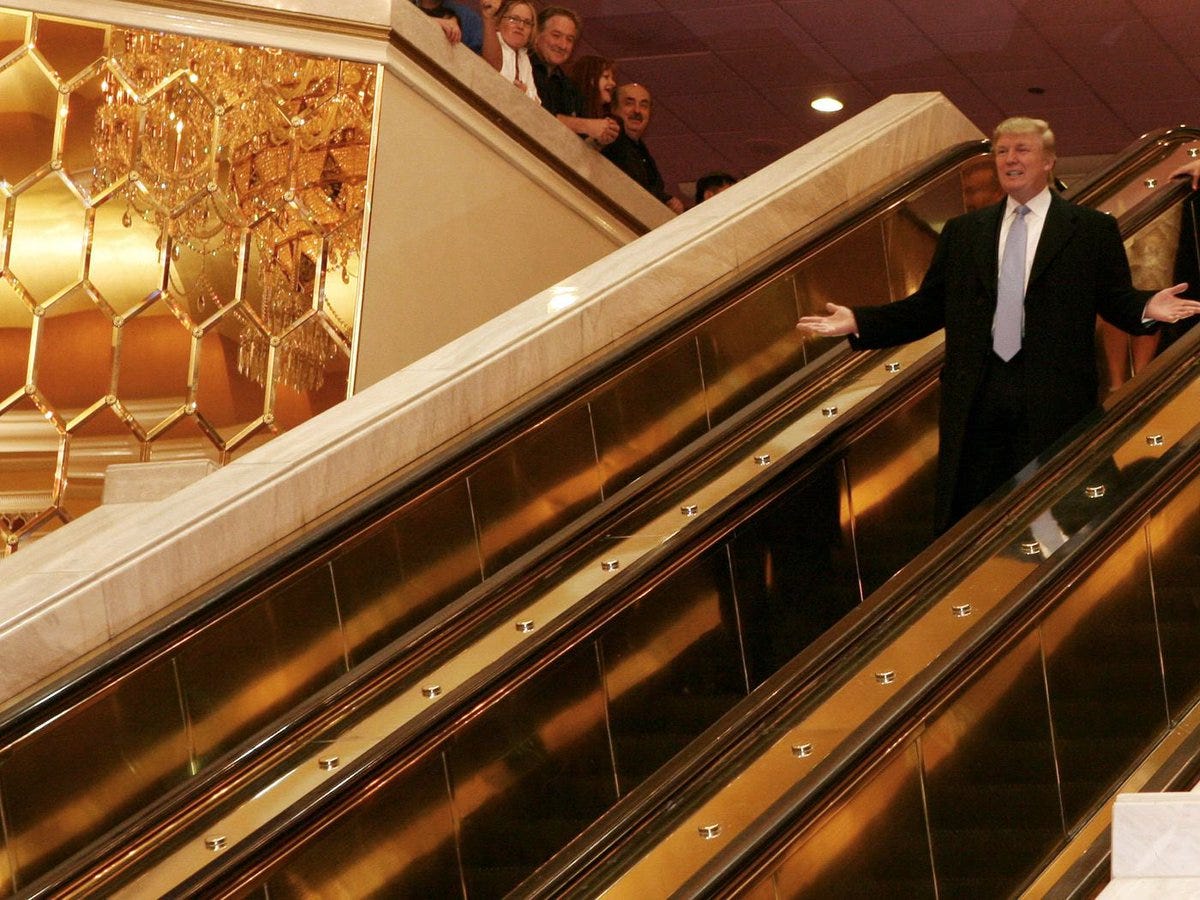
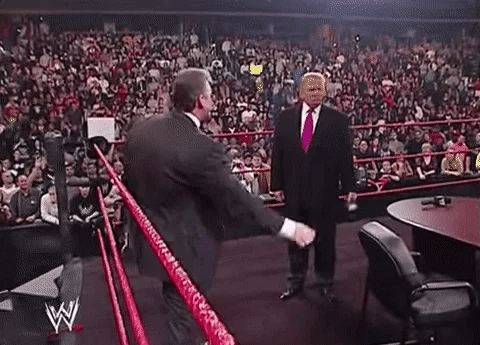

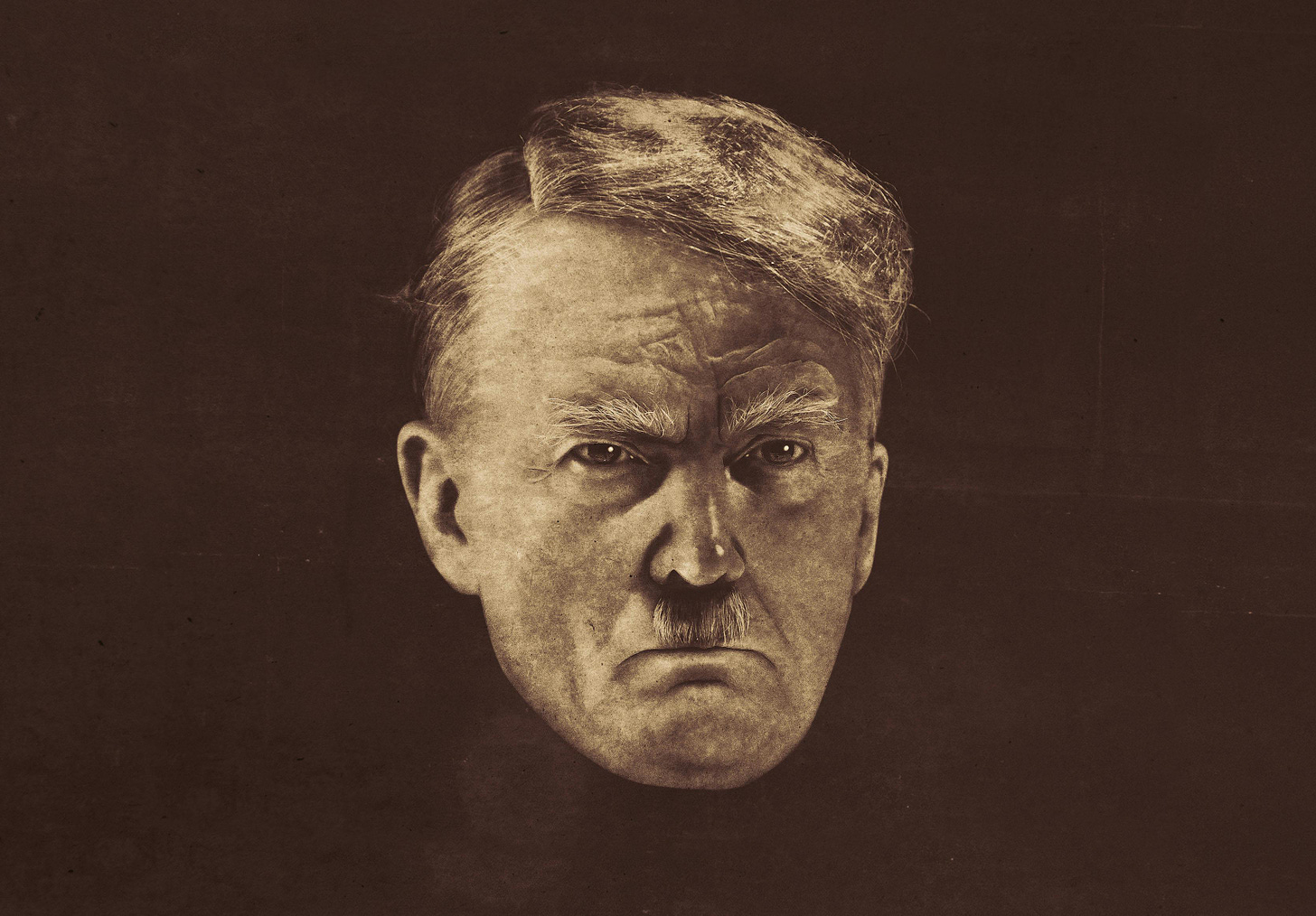

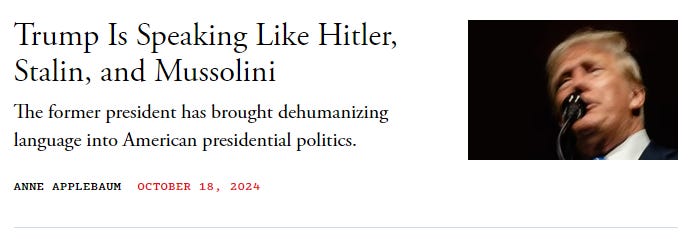
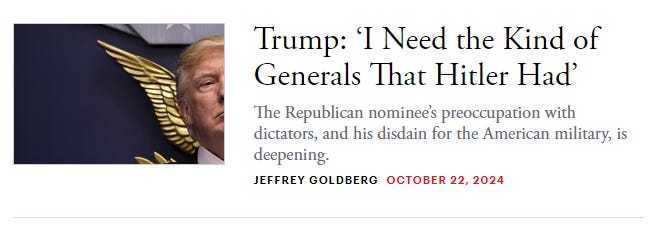

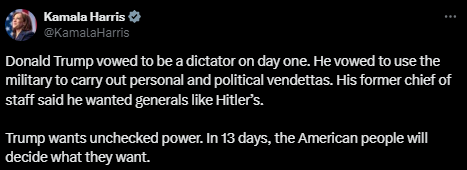
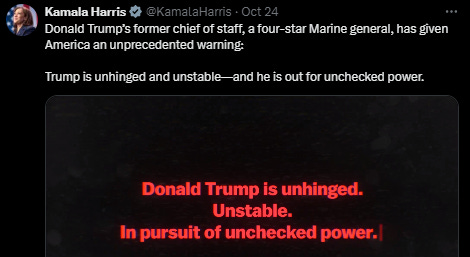

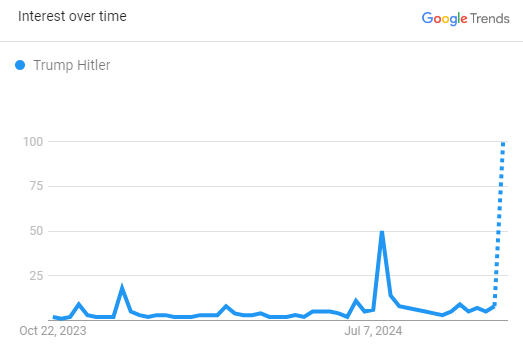
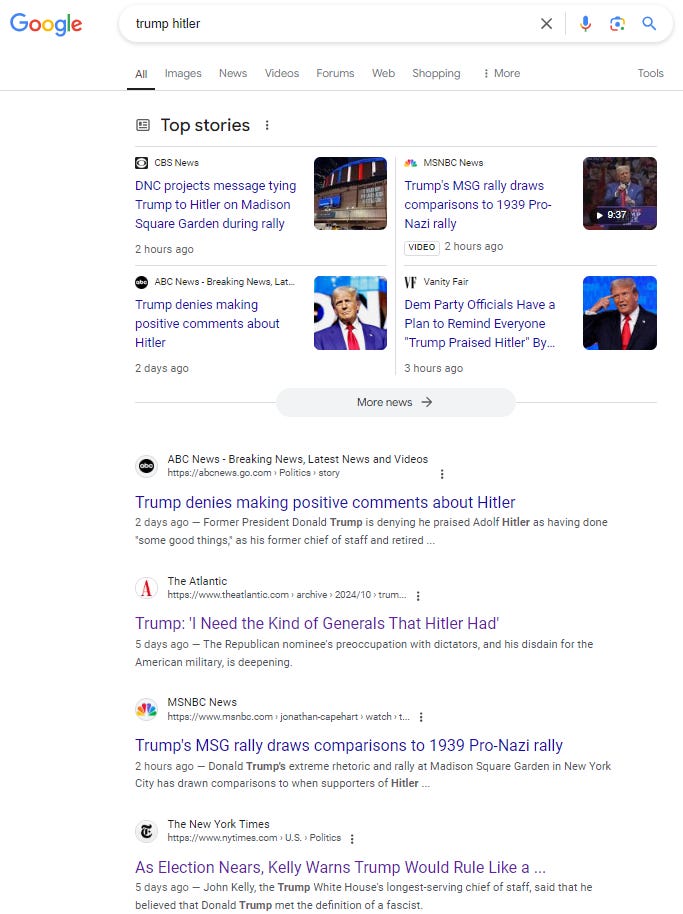
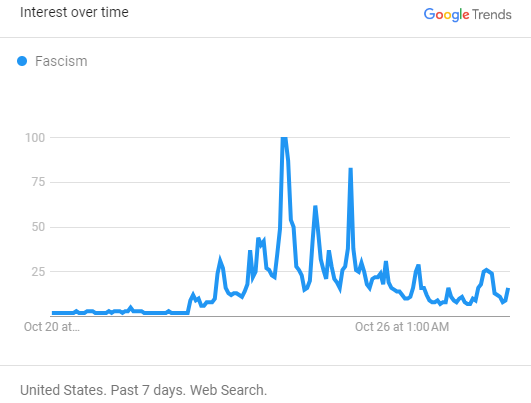
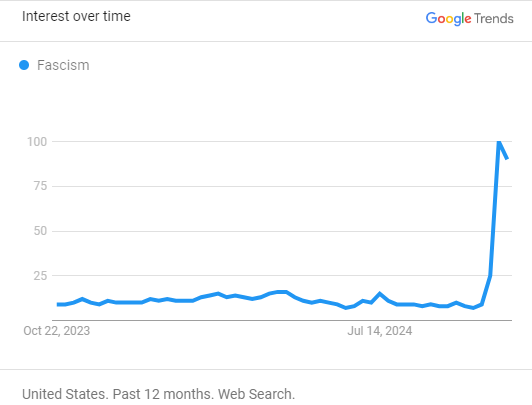
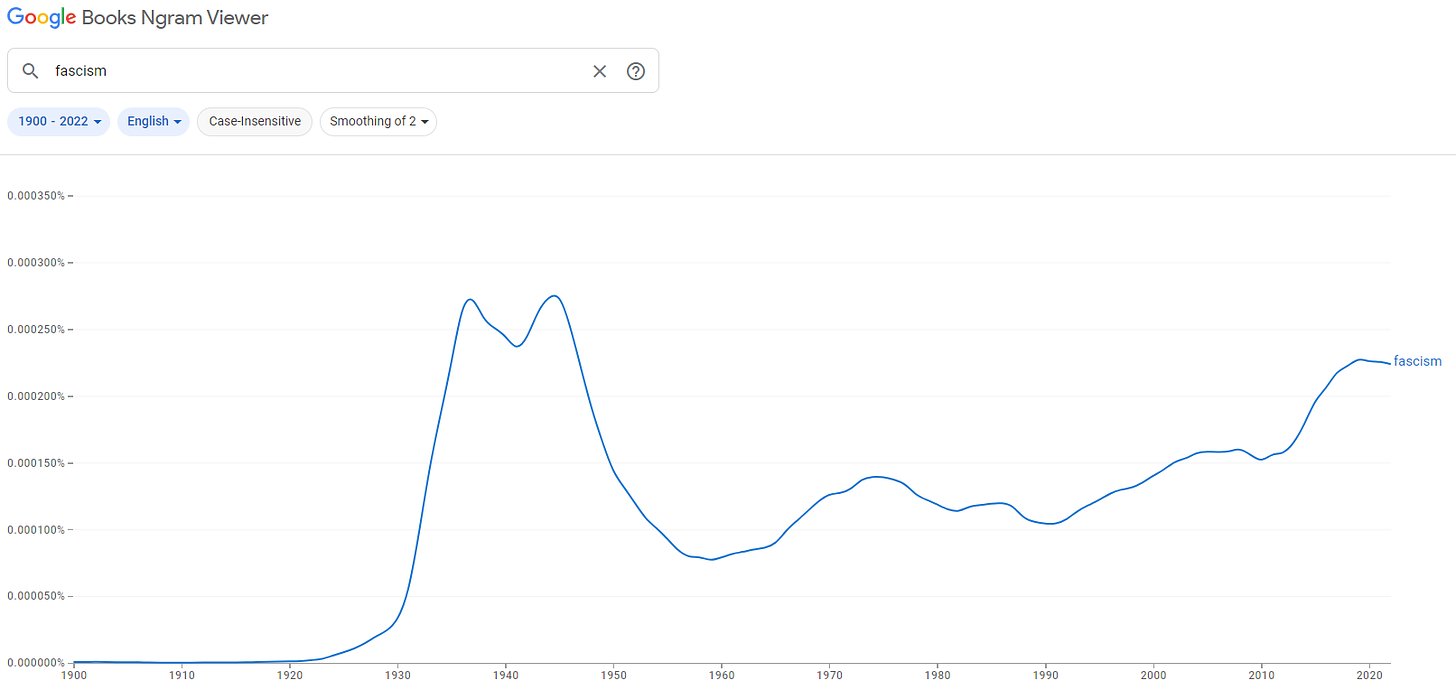

William, this is the kind of writing I am on Substack for. Balanced and well argued. You won’t find work like this anywhere else.
I don’t have anything to add to this discussion as I tend not to engage directly in politics on this platform, but this is well worth the read.
It also helps to note inconsistencies between what people say they are worried about, and what they actually do. For example, it’s difficult to take climate alarmists seriously when they all arrive at their big conference in their personal private airplanes.
Likewise, it’s difficult to believe that the Dems truly thought “democracy was on the ballot” and then sent in a decrepit old man to “save” it.